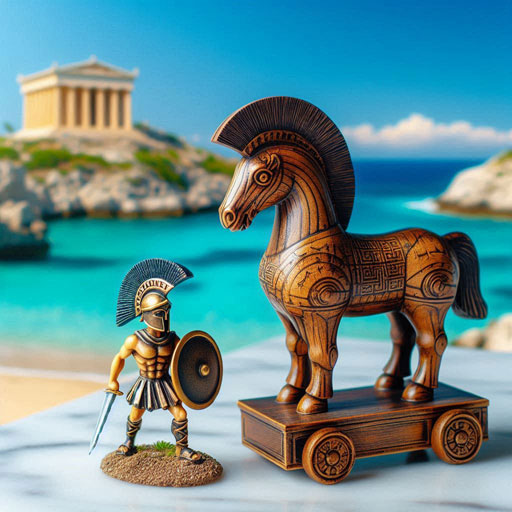Odysseus, the legendary king of Ithaca, is one of the most celebrated heroes in Greek mythology. Known for his intelligence, bravery, and resilience, Odysseus's story has captivated audiences for millennia. In this blog post, we will explore the life, adventures, and legacy of this iconic figure through detailed sections that cover his background, key traits, major adventures, and cultural impact.
Table of Contents
- Background and Character
- Key Traits
- Role in the Iliad
- Adventures in the Odyssey
- Return to Ithaca
- Legacy and Cultural Impact
- Other Myths and Legends
Background and Character
Parentage and Early Life
Odysseus was born to Laertes, the king of Ithaca, and Anticlea. He grew up in a royal household where he was trained in the arts of war and governance. From a young age, Odysseus was noted for his sharp intellect and resourcefulness.
Family
Odysseus married Penelope, a match celebrated for its mutual respect and devotion. They had one son, Telemachus, who played a significant role in Odysseus's story, particularly during his return to Ithaca.
Key Traits
Cunning and Intelligence
Odysseus’s cunning is perhaps his most defining trait. He is often referred to as "wily" or "crafty" for his ability to devise clever strategies and solutions. His idea of the Trojan Horse led to the fall of Troy, showcasing his tactical genius.
Endurance
Odysseus is also renowned for his endurance and perseverance. His journey home from Troy took ten years, filled with numerous trials and tribulations that tested his resolve.
Role in the Iliad
In Homer's "Iliad," Odysseus is portrayed as a key leader and strategist in the Greek forces during the Trojan War. He is involved in critical diplomatic and combat missions, contributing significantly to the Greek victory.
Adventures in the Odyssey
The Journey Home
The "Odyssey" details Odysseus’s 10-year voyage back to Ithaca after the Trojan War. His journey is marked by encounters with mythical creatures and divine beings, each presenting unique challenges.
Notable Encounters
Cyclops Polyphemus

Odysseus blinds the Cyclops Polyphemus, which incurs the wrath of Poseidon, Polyphemus’s father.
Circe
The enchantress Circe turns Odysseus’s men into swine. With the help of Hermes, Odysseus overcomes her spell and gains her assistance.
Sirens

The Sirens lure sailors to their doom with their enchanting song. Odysseus plugs his men's ears with beeswax and has himself tied to the mast to safely hear their song.
Scylla and Charybdis

Odysseus navigates between Scylla, a six-headed monster, and Charybdis, a deadly whirlpool, demonstrating his leadership and courage.
Calypso
The nymph Calypso holds Odysseus captive on her island for several years until the gods intervene, allowing him to continue his journey home.
Return to Ithaca

Upon his return to Ithaca, Odysseus finds his home overrun by suitors vying for Penelope’s hand. Disguised as a beggar, he assesses the situation and, with the help of Telemachus and loyal servants, defeats the suitors and reclaims his kingdom.
Legacy and Cultural Impact
Cultural Impact
Odysseus’s story has had a profound influence on Western literature and culture. His character represents the archetype of the clever hero and the enduring human spirit.
Homer's Influence
The "Odyssey" and the "Iliad" have inspired countless works of literature, art, and philosophy, cementing Homer's legacy as one of the greatest storytellers in history.
Other Myths and Legends
Various other myths involve Odysseus, including those outside of Homer’s epics, such as his participation in the hunt for the Calydonian Boar and his role in the story of Palamedes.
Interested in Greek mythology? Visit our blog here

